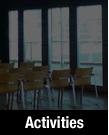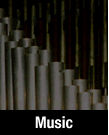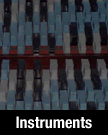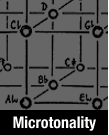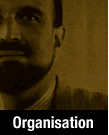
|
MicroFest Amsterdam 2019 | festival for microtonal musicFestival | December 1, 2019 - 11.00-21.30 hours | Small Hall, Muziekgebouw aan ’t IJ in AmsterdamMicroFest Amsterdam 2019 In December of this year the Huygens-Fokker Foundation organizes for the third time a one-day festival for microtonal music in The Netherlands, under the title MicroFest Amsterdam 2019. A festival for many enthusiastic listeners interested in microtones, unconventional tunings or new fresh sounds. The broad programming also connects the concerts to a larger audience and creates an interesting representation of the variety of styles within microtonal music. Music that, as the famous American composer Charles Ives once described it, consists of "the notes between the keys of the piano". These microtones, tunings or divisions of the octave are leading to completely new musical and tonal possibilities, a source of fresh sounds that forever expands the ear of the listener and permanently change the thinking about music. During this edition of the festival, the microtone specialists from Ensemble SCALA, Vokalprojekt 31 and Scordatura Ensemble will once again be present. The latter ensemble will play a concert program around the original recording of a lecture by Harry Partch from 1942. In addition, Vokalprojekt 31 will perform works in the 31-tone system by the Dutch composers Henk Badings and Jan van Dijk and Ensemble SCALA will perform new compositions by Julia Werntz and Piet-Jan van Rossum. In between these three concerts two free concerts will take place, namely a lecture recital by Georg Vogel with microtonal improvised music and a concert with the four clarinettists from Clarinets in Space. Enough reasons to visit this one-day festival for microtonal music. (Sander Germanus, artistic director)
Programma MicroFestContrasten | 11.00 - 12.00 hoursVokalprojekt 31 starts off with the opening concert of the MicroFest Amsterdam 2019, a one-day festival for microtonal music, by performing a resplendent program which focuses on 31-tone music for vocals from 1946 to the present. The ability of the human voice to sing microtones is demonstrated in Vokalprojekt 31: Valeria Mignaco, soprano | Alfrun Schmid, mezzo soprano/alto | Daan Verlaan, tenor | Erks Jan Dekker, baritone The accompaniment of this special project will be done by the regular Fokker organist Ere Lievonen.
Program Henk Badings - excerpts
from 'Contrasten' (1952) Clarinets in Space | 13.30 - 14.15 hours (free entrance)During the concert of Clarinets in Space, microtonal music for clarinet is central. The clarinet quartet of the same name plays the long-awaited premiere of the work Spacewalk by Sander Germanus, in which the weightlessness in space and the disorienting effect of a space walk are expressed. The Roadrunner Trio (clarinet, cello and accordion) will perform the composition Life on Mars by Cecilia Arditto, specially written for the trio's musicians and in which minimal pitch distances create a tranquil atmosphere. The short but sweet concert will start with Article 7, an electrifying work for solo bass clarinet and soundtrack by Rozalie Hirs, which she composed in 2012 especially for clarinettist Fie Schouten. Program Rozalie Hirs - Article 7 [seven ways to climb a mountain] (2012) Cecilia Arditto - Life on Mars (2016) Sander Germanus - Spacewalk (2016-2017)
Harry Partch - Lecture 1942 | 15.00 - 16.00 hoursThe Scordatura Ensemble is back with a special concert. An original acetate recording from1942 was Ever since it was founded in 2006 by musicologist Bob Gilmore (1961-2015), Scordatura Ensemble has performed adventurous music from a series of contemporary composers who are mainly concerned with new tunings and microtonality to enrich the harmonic means of music. The basic occupation of voice, viola and keyboard is often extended with other instruments, depending on the musical context. In addition to "classics" from the microtonal repertoire, Scordatura mainly plays new works written especially for them, often with theatrical aspects, video, dance or multimedia art. This afternoon they show their specialism with the performance of several works by Harry Partch. A rare opportunity not to be missed! Scordatura: Reinier van Houdt, Chromelodeon | Chris Rainier, voice & Adapted Guitar I / Kithara I | Elisabeth Smalt, Adapted Viola & Kithara I | Alfrun Schmid, voice & Kithara I
Program
Progressions Within One Octave (1942) Dark Brother (1942) San Francisco: A Setting of the Cries of Two Newsboys on a Street Corner (1943) Psalms: The Lord is my shepherd, By the Rivers of Babylon (1932-1943) From the Seventeen Lyrics by Li Po: A Dream, I am a Peach Tree (1932-1933) a selection from: Barstow—Eight Hitchhikers' Inscriptions (Version C 1943) The music of Georg Vogel | 16.30 - 17.15 hours (free entrance)The microtonal improviser Georg Vogel (Salzburg, 1988) is a young keyboardist, composer and instrument builder from Vienna. He makes music in trio 'Dsilton' that plays microtonal jazz and with which he has become a well-known name within the Austrian jazz scene. This afternoon Vogel will give a lecture recital about his own 31-tone music that he will perform on the M-Claviton, an enharmonic 31 + 5-tone keyboard that was built by Vogel himself. In addition to the performance of some of his compositions, Vogel provides an overview of the special possibilities of the instrument and an explanation of the layout of the striking keyboard. Georg Vogel will perform the following works of his own: Utes Reges Mides, Feddy Föhl, Ferry Fahrsept, en-zug & Lill Georg Vogel about his presentation and the instrument he built: "This is a presentation of music in 31-EDO on the M-Claviton, a split sharps 31-tone keyboard. It features pieces of the recent solo album and new works consisting of expanded tetrachord based diatonicism, multiple twelve note selections, chord based harmonies with enharmonically changed intonations and various frames for improvisation in 31 equal temperament as well as an overview of the instrument and its keyboard layout."
The Evening of the Microtone | 20.15 - 21.45 hoursTo top it all off, Ensemble SCALA closes the festival with the concert 'The Evening of the Microtone', in which the many facets of microtonality will come to the fore. Microtonal music in all kinds of styles, from modern classical to more pop-oriented. In general, the term "microtonal" says nothing about the style of music. Microtonality only indicates one of the elements with which a musical structure can be made. So it says nothing about the form, style or expression of a composition. And therefore it depends on how microtones are incorporated in music whether the result will appeal to the audience or not. The composers that will be heard this evening all have a completely different approach to microtonal music. The program includes a premiere by Julia Werntz of the Boston Microtonal Society, a new composition by the Dutch composer Piet-Jan van Rossum (starring the Carrillo piano) and several microtonal works from the repertoire of Ensemble SCALA that has been built up over the past nine years. In other words, a colorful evening full of microtones!
Program
Piet-Jan van Rossum - Adelwarths Schmetterlingsfänger (2019) premiere Joachim F.W. Schneider - Drei Gassenhauer (2019) Sebastian Dumitrescu - Ancient Wisdom (2019) Cecilia Arditto - Musica invisible para flauta (2003) Julia Werntz - Scala Obscura (2019) premiere Matthias Kadar - Hangszon (2018) Melle Weijters - Improspectrum (2019)
TicketsSingle concerts are 13,50 euros, a passe-partout (20% stack discount by ordering 3 MicroFest concerts) for the entire festival costs 33 euros. >>> Reduction tickets (Stadspas, CJP) for single concerts are 11 euros. Tickets can be reserved at the box office of the Muziekgebouw (tel. +31 20 7882000).
Tip: restaurants in the neighborhood
There are several restaurants in the neighborhood of the Small Hall to eat lunch or have diner, like the grand café 4'33, on the ground floor of in the Muziekgebouw aan 't IJ. At the Oosterdokskade in the public library (OBA) there are two restaurants, Babel on the top floor and Vapiano on the ground floor.
Financial supportThis concert is made possible by the support of: Amsterdams Fonds voor de Kunst, Zabawas Foundation, Amsterdam Community (District East), Van den Berch van Heemstede Foundation and Muziekgebouw aan 't IJ. Also the SNS REAAL Fonds (renovation Fokker organ) and the Muziekgebouw aan 't IJ. A donation of the Nederlands Akoestisch Genootschap and a shared contribution of six reputable consultancy offices, namely Cauberg-Huygen, DGMR, LBP|SIGHT, M+P, Peutz and Wijnia-Noorman-Partners (WNP) made it possible for Huygens-Fokker to purchase the Carrillo-piano.
|
Program
Links |

